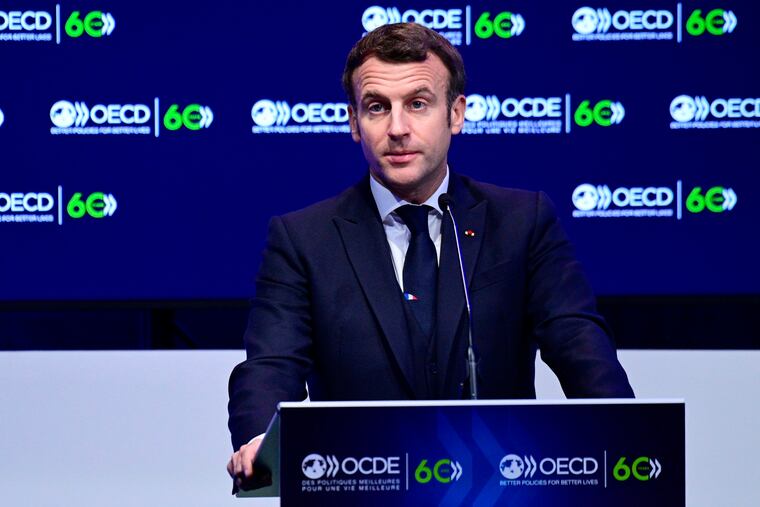French President Emmanuel Macron tests positive for the coronavirus
The 42-year-old president will isolate for the next seven days but will continue his work, the country’s presidential palace said.

PARIS — French President Emmanuel Macron has tested positive for the coronavirus, the country’s presidential palace announced Thursday.
He was administered a test after he began to show symptoms associated with COVID-19, the disease caused by the virus. The 42-year-old president will now isolate for the next seven days but will continue his work, the statement added. A spokeswoman for the palace told Reuters that all of the president’s coming trips — including a visit to Lebanon that was scheduled for next week — have been canceled.
Macron is the latest world leader to test positive for the virus, including President Donald Trump, Britain’s Boris Johnson and Brazil’s Jair Bolsonaro. All have recovered.
The French president’s itinerary in the last week has seen him interact with multiple heads of state, at least one of whom, Spanish Prime Minister Pedro Sánchez, is now self-isolating after dining with Macron on Monday at the Élysée Palace in Paris. French Prime Minister Jean Castex, who has also been in contact with Macron, said he would also be self-isolating, Agence France-Presse reported.
But Macron also met in person with the leaders of 24 E.U. countries on Thursday and Friday last week at a summit in Brussels. (Two leaders were absent: Croatia’s was sick with COVID-19, and Estonia’s was quarantining.) Ahead of the summit, some diplomats were concerned about the health risks of an in-person meeting. An E.U. spokesman didn’t immediately respond to a question about whether the leaders who were present would now quarantine.
French authorities have informed the European Union that they believe Macron was a contagion risk starting Monday evening, meaning that the leaders who attended last week’s summit are not considered contacts, an E.U. official said, speaking on condition of anonymity to candidly discuss the health situation.
The official said that sanitary measures were taken at the summit and that no other participant has tested positive. It was not immediately clear why France believes Macron was contagious starting Monday evening.
In any case, not all European leaders appeared to trust the Élysée’s assurances that Macron was not contagious last week. Belgian Prime Minister Alexander de Croo said he was being tested for COVID-19 and would quarantine until he receives the result, after sitting in a room with Macron — along with most of the rest of Europe’s leaders — for almost 24 hours straight starting the afternoon of Dec. 10.
This week, in addition to Sánchez, Macron has also met with European Council President Charles Michel on Monday and with Portuguese Prime Minister António Costa on Tuesday.
» READ MORE: Pa. threatens at least 150 restaurants with fines or closure for allowing indoor dining in defiance of state ban
On Wednesday, the day before his diagnosis, Macron also met with all of his government ministers, although it was not immediately clear whether this meeting took place in person and, if so, whether all participants wore masks. The Élysée Palace did not immediately respond to questions about the details of that meeting.
Michel will quarantine “as a matter of precaution,” his spokesman said, after the Monday meeting with Macron. He tested negative on Tuesday and “is not considered to be a close contact,” his spokesman, Barend Leyts, wrote on Twitter.
French first lady Brigitte Macron is likewise self-isolating but currently has no symptoms, according to a statement from her office to AFP. She had tested negative for the coronavirus as recently as Tuesday, her office said, in advance to a visit to a pediatric ward at a Paris hospital.
In late October, a surge of infections prompted Macron to issue another national lockdown, the country’s second since the pandemic began. While nonessential shops began reopening late last month, bars and restaurants must stay closed into January and an evening curfew has remained in place.
Macron said that exceptions would be granted for Christmas Eve so that people could “share these moments together among family.”
While the number of new infections showed some improvement after the nearly month-long lockdown, hospitals appear to be more saturated than they were during a first wave in the spring.
Vaccination in France is set to begin in late December or early January and would not be mandatory, Macron has said.
Macron’s positive diagnosis raised immediate questions about the handling of Brexit negotiations, which need to be concluded within days if there is any chance of Britain and the European Union ratifying a trade deal by Dec. 31, the day London will sever its final ties with the bloc. Leaders had previously floated the possibility of an additional in-person summit in the next two weeks to finalize a deal.
European policymakers have complained that negotiations about thorny issues are nearly impossible when they are conducted virtually, as has mostly been the case since March.
Macron has been one of the most stubborn European leaders during Brexit talks, and his sign-off is crucial to any Brexit deal.
The Élysée did not provide details on the specifics of Macron’s condition, but a spokesperson said that he would still preside over a Thursday meeting on development via videoconference from isolation.
Birnbaum reported from Brussels. The Washington Post’s Rick Noack in Berlin and Teo Armus in Washington contributed to this report.